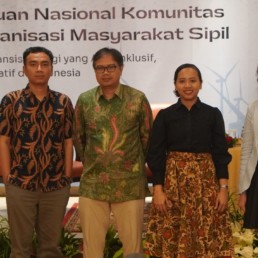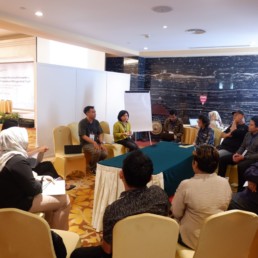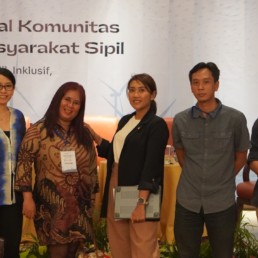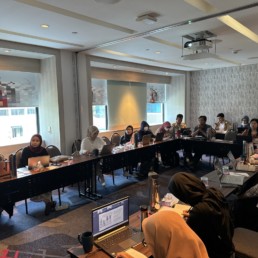Introduction
The global discourse on energy transition has taken center stage in an era marked by pressing environmental challenges. Initiatives like the Just Energy Transition Partnership (JETP) and Indonesia’s pioneering Energy Transition Mechanism (ETM) have emerged as catalysts for change. Established in 2022 alongside the G20 Summit, JETP endeavors to galvanize public and private sector investments in this pivotal transition. Building on this foundation, the Government of Indonesia has introduced the ETM framework, focusing on the Carbon Reduction Facility (CRF) and Clean Energy Facility (CEF). While these initiatives commendably emphasize the technical aspects of renewable energy acceleration, they are urged to place equal emphasis on the human element—the linchpin of an indeed just energy transition. This project delves into the imperative for inclusivity, shedding light on its multifaceted dimensions. From securing livelihoods in industries to transforming and empowering underrepresented groups, particularly women, this narrative advocates for a holistic approach. Furthermore, it underscores the pivotal role of localized, community-driven planning in charting a course toward a more equitable, inclusive, and sustainable energy transition.
Objectives and Strategy
In this project, PWYP will focus on strengthening CSOs and WROs’ capability for inclusive and participatory gender-just energy transition; also, the government will implement a gender justice component in the national energy transition plan.
Expected outputs:
The desired output of this project for the first year is:
- Feminist lens energy transition studies conducted to generate evidence for effective influencing at the national and regional level;
- Regional convening of CSOs on just energy transition conducted;
- Advocacy and campaign tools developed to hold government to account on gender JET;
- Public campaign tools and materials are available;
- Local and national campaigns conducted by Impacted frontline communities, CSO, WRO, DPO, and media;
- Media engagement;
- GoI increased understanding of the justice component in energy transition;
- Increased awareness of policymakers recognizing CSOs, WROs, and DPOs in JET national plans.
Activities:
- Conducting a scoping study on the feminist lens in energy transition at the national level;
- Conducting public discussion to disseminate the scoping study result;
- Outreach and dialogue with ASEAN stakeholders such as the Ministry of ESDM, ASEAN Centre for
- Energy, ASEAN Energy Commission, or JETP Secretariat;
- SEA regional CSO webinar;
- SEA CSO regional convening;
- Creating a module/guideline book for CSO and WRO on campaigning and advocating gender inclusivity;
- Create a series of campaign materials on several platforms (website, infographic, videography, social media);
- Media visit;
- Media briefing;
- Workshop with relevant ministries/agencies at the national level;
- Series of audiences with relevant ministries/agencies at the national level;
- Policy dialogue with relevant ministries/agencies at the national level.
Method of implementation
At PWYP Indonesia, our mission is driven by a collaborative and comprehensive implementation approach. Here’s an overview of our strategies and activities:
Collaboration: We work closely with several PWYP Asia Pacific members and the Bersihkan Indonesia coalition to address the imperative justice issue in the energy transition.
Research: Our efforts include conducting scoping studies through a feminist lens grounded in the practical experiences of women and vulnerable groups impacted by energy transition. We particularly emphasize the gender and inclusivity aspects.
Impact mitigation: We focus on understanding and mitigating potential impacts on women and vulnerable groups arising from the energy transition.
Awareness campaigns: PWYP Indonesia strives to raise public awareness regarding the critical importance of gender justice in the energy transition. Our campaigns target audiences at national and regional levels.
Government dialogue: We actively dialogue with the national government, advocating for gender and inclusivity considerations in energy transition policy-making. This includes initiatives like JETP, ASEAN, and ETM.
Collaboration with MoSA: We collaborate with the Government of Indonesia, specifically the Ministry of Social Affairs (MoSA), in support of their initiatives related to social welfare, poverty alleviation, and sustainable development goals.
Monitoring and evaluation: We employ robust monitoring and evaluation systems aligned with PWYP Indonesia’s quality standards to ensure project success. This system incorporates adaptive learning and management tools to facilitate timely project adjustments.
People We Work With Directly (PWWWD)
This project will involve Civil Society Organizations, Women’s Rights Organizations, People with Disability Organizations, the local community, and other vulnerable groups at the national, regional, and sub-national levels.
Periode
This project will be held for the first year from 1 July 2023 to 30 June 2024.



